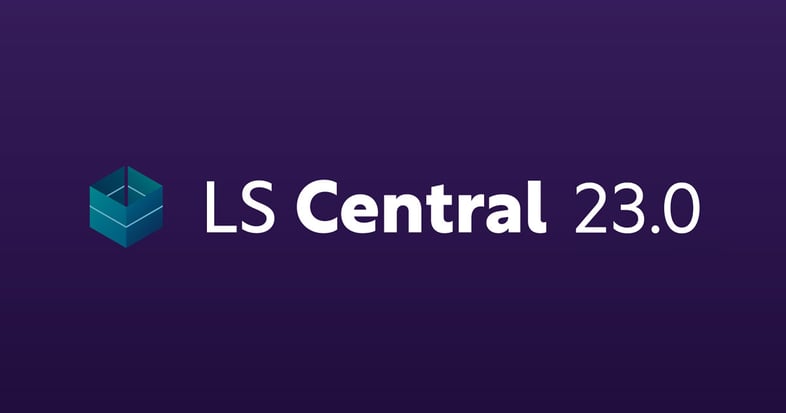LS Central 23.0: new for replenishment, hotels, and self-checkout

LS Central version 23.0 was released on October 4th, 2023. Here’s an overview of what we have added and improved in the system.
Replenishment: Historical coverage days for Effective Inventory calculation
The replenishment calculation is based on the concept of Effective Inventory which considers the item’s inventory quantity and outstanding quantities from open documents, like Purchase Orders, Sales Orders, Transfer Orders, and Assembly Orders. Until today, it was only possible to consider documents with a future receiving/shipping date in the effective inventory calculation.
But with LS Central version 23.0, you can now include historical documents in the calculation and define how far back from the current work date documents should be considered using the Coverage option. This helps retailers who regularly face delayed shipments from vendors to have a more accurate calculation and better proposals in their Replenishment Journals.
Replenishment: Improvements to Planned Sales Demand
The Planned Sales Demand functionality is a powerful tool to help you define future demand changes based on ad-hoc events, promotions, or budgets. When the Planned Demand Type Substitute Quantity was used, then the quantity specified in the Planned Sales Demand always overruled the calculated quantity for Average Daily Sales. Now, you can finetune this behavior with the new Substitute Rule, which allows you to specify the following actions: Always Use Planned Demand (the original behavior), Use Base Value if Higher, or Use Base Value if Lower, and tremendously enhance the responsiveness of the calculation model for items with planned demand and volatile demand.
Replenishment: Enhanced reports for batch calendars
The Replenishment Batch Calendars allow you to specify on which days of the week your Replenishment Journals should be calculated and is especially helpful for retailers who have different calculation windows due to seasonal peaks. The typical interval to replenish stores from the warehouse could be once per week, such as every Monday, for example. In the high season, it could be twice per week or even more often.
The maintenance of the Replenishment Batch Calendar can be done manually or through a report. We have enhanced the report in LS Central version 23.0 to allow you to make updates at specific weekly intervals, like bi-weekly, for example.
LS Central for hotels: improvements to folio processes
Now possible to define folios for room reservations using routing rules
When it comes to invoices, it can get tricky when guests try to split charges on the same room, for example, or a company only wants to pay for rooms and breakfast for their employees and leave all other charges up to the individual. The process gets even more convoluted when you need to apply certain discounts for specific guests as well. But now with LS Central for hotels, there are multiple types of invoices you can use that offer more flexibility, making it easier to split bills between guests or companies, and handle other complicated processes.
The folio framework is set for both individual reservations and group reservations and now also works with routing rules. The routing rules functionality allows you to decide in advance what folio will pay for each aspect of a room reservation. For example, you may have a guest from a company that is only required to pay for extras like sandwiches, snacks, sodas etc., but the company or travel agency they are associated with is paying for their hotel room and breakfast.
New option to accept pre-paid deposits for specific folios on a reservation
LS Central for hotels now supports deposits on specific folios within a reservation, allowing you to assign a specific folio for the deposit when the prepayment is done. Let’s say you have guests coming to stay with you under a travel agency and they want to pre-pay for extra charges, such as activities or rentals. With the new pre-paid option, you can assign that deposit directly to the guest folio. Then, if the travel agency is pre-paying for the rooms and breakfast, you can assign that deposit to the company folio. This process helps you more easily keep track of complex invoices and ensure all payments and finances are processed correctly.
Additionally, the night audit setup now considers the consumption of deposits when using accrual accounting. If there are prepaid deposits for a reservation, the deposit is consumed as much as possible for each day. If the deposit is attached to a folio, then it is only consumed to that folio, or otherwise used without a folio check.
New supporting functionality: Self-Checkout Connector (SCO) for LS Central
We have now released Self-Checkout Connector (SCO) for LS Central with version 23.0. The purpose of the SCO is to simplify the adoption of self-checkout hardware with the LS Central solution.
The SCO works as a layer between LS Central and self-checkout hardware from different manufacturers, communicating with LS Central web services and implementing the mapping between LS Central and the self-checkout hardware. Currently, the SCO is only able to connect with self-checkout hardware from Diebold-Nixdorf, and it does this by using an LS Central extension to a number of web services and Windows service plugins for various self-checkout hardware stations provided by Diebold-Nixdorf.
The SCO can be configured in multiple ways within the store. For example, you can have one SCO connecting with multiple self-checkout hardware stations in a single store, or you can set up LS Central and the SCO set up directly on the self-checkout hardware.

